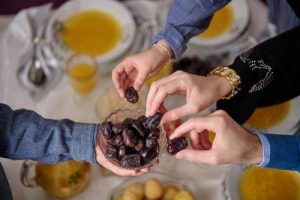Nur Adila Samingan, Dietitian at IMU Nutrition and Dietetics Department, explains how to fast with purpose this Ramadan and discusses the practical aspects of fasting without compromising your health.
Malaysians of all faiths are all familiar with Ramadan and many – Muslims and non-Muslims alike – look forward to the familiar sights and smells of bazaars selling delicious treats for breaking fast.
However, while the purpose of fasting during Ramadan is to practice self-discipline, explains Nur Adila Samingan, Dietitian at IMU Nutrition and Dietetics Department, there are practical aspects to consider as well.
“To understand what happens to the body while fasting, it is important to first understand how the body responds to food,” she explains. “Quite simply, our bodies convert food into energy and any excess is converted into glycogen, which is then stored. This process is regulated by insulin, which the body produces when we eat. The more we eat, the more insulin is produced and more energy is stored.”
In contrast, when a person fasts, the body will first use energy from the last meal consumed before turning to stored glycogen. As the day wears on, the body will break down stored protein and fats for energy.
To protect itself, the body increases production of human growth hormone to reduce muscle loss. In addition, fasting also reduces the production of oxidative stress and increases antioxidant enzyme activity, hence, reducing the inflammation process, which in turn is associated with a longer, healthier lifespan, explains Nur Adila.
In spite of all this, the reality of fasting from both food and water from sunup to sundown can be challenging, especially for young people and new converts to Islam who are fasting for the first time.
Fasting with Purpose
“It is an obligation for adult Muslims to fast during Ramadan; for children, this begins when they reach puberty,” explains Nur Adila. “Naturally, even for those who have been fasting for many years, the first few days will be a period of adjustment as the body adapts to the different eating schedule. For those fasting for the first time, remember that our bodies adapt quickly, just like how a first workout causes sore muscles before you get stronger.”
It is also important that fasting should not cause any harm so for health reasons, women who are menstruating, pregnant or lactating are exempted, as are those who are chronically ill or elderly. Rather, acts of charity may be performed as a substitute.
In spite of this, many Muslims still choose to fulfil this important obligation and Nur Adila says it is best to proceed with advice from your regular doctor. Those with diabetes, for example, should discuss with their doctors how to manage their medication and food intake to prevent blood sugar levels from getting too high or too low.
Among diabetes patients, frequent urination is a sign of high blood sugar, while cold sweat or dizziness are signs of low blood sugar. In the event of low blood sugar, it is advisable to break your fast immediately as, in extreme cases, low blood sugar can lead to diabetic coma.
Individuals who have gastritis should avoid common triggers, which includes foods with high fat content, spicy foods, pepper, citrus juices, carbonated drinks and caffeine. However, individuals have different reactions to different foods, so it is best to consult with your doctor beforehand, who can advise you based on the severity of your condition and level of control.
Fasting for the First Time
To help children ease into the experience, Nur Adila recommends that parents introduce fasting gradually, before they come of age.
“To help prepare them for the future when they are obligated to fast fully, parents can encourage their children to fast for half a day, or to fast from food while permitting water.” she said. “Lastly, be sure to celebrate their achievements, to keep them motivated.”
For new converts, she adds, “It is important to remember that fasting during Ramadan involves more than abstaining from food and water, and includes self-discipline against indulgent behaviour as well. Collectively, these efforts are intended to strengthen one’s spiritual relationship with God, and you can also try to fast during Rajab and Shaaban, prior to Ramadan, as a way to practice self-discipline.”
Top Dietary Tips for Managing Food Intake and Energy Levels
During Ramadan, it is particularly important to manage one’s food intake well, with careful consideration for ensuring sufficient nutrients and energy for the day.
For example, good options at sahur include:
– Foods that are high in fibre and complex carbohydrates such as basmati rice, whole wheat cereals and overnight oats
– Healthy fats such as nuts, seeds and good oils
– Protein such as eggs, lean meat, lentils, legumes, milk and yogurt
– Vegetables and fruits that have high water content such as watermelon, cucumber and pineapple

Foods like these, especially high-fibre and protein-rich foods, take longer to digest and hence keep you feeling full for longer; this provides sustained energy while fruits help with hydration, explained Nur Adila.
She also advises to minimise intake of:
– Caffeinated drinks like tea and coffee which can contribute to dehydration
– Foods that are high in sodium as these increase thirst
– High levels of sugary foods which cause a sudden spike in blood sugar followed by a low-energy slump
At the end of day, when it is time to break your fast, she advises taking simple foods first, that are easy for the body to digest, instead of a large, heavy meal that will burden the digestive system. Good options include water, dates and light foods like jelly, pudding and fruits which also provide hydration, or options like bubur lambuk (porridge).
In conclusion, Nur Adila advocates for a well-rounded meal featuring adequate portions of protein, cereals, fruits, vegetables, and healthy fats to nourish the body with essential nutrients. Through mindful dietary decisions this Ramadan, individuals can enhance their fasting experience, embracing its benefits and blessings more fully.





